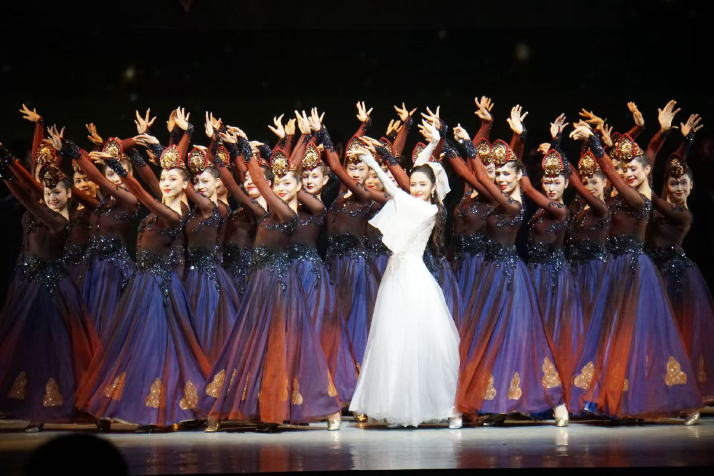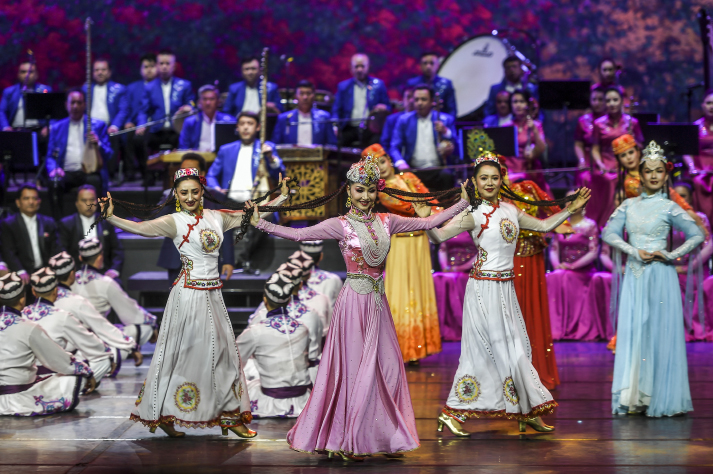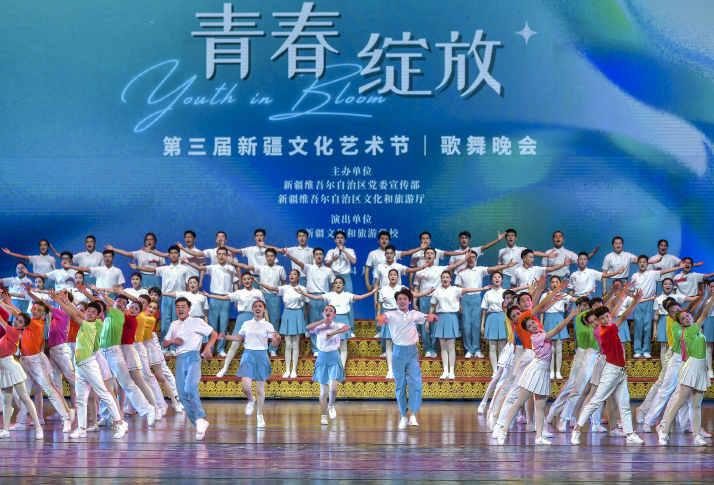| Xinjiang Today |
| No biz like show biz | |
|
|
 Far Away and Right Here, the opening dance drama of the Seventh China Xinjiang International Dance Festival, is staged in Urumqi on July 20 (WANG YAJUAN)
Zhou Wenli, who lives in Urumqi, checks several apps and websites daily to find out what's happening on the city's entertainment front. "There are so many great plays, concerts and other shows this year. Cultural spending is now a must in our household budget," she told Xinjiang Daily.
Xinjiang's entertainment market is brimming with energy and diversity, offering a rich mix of live music, plays, traditional opera, stand-up comedy and electronic music parties. With its rich musical heritage and dynamic cultural scene, the region is rapidly becoming a highland for the performing arts. Bolstered by government policies and rising consumer demand as well as cutting-edge technologies and cross-industry collaborations, productions are delivering stunning visual experiences and redefining artistic expression. Flourishing diversity July is an exciting month for dance lovers, with the Seventh China Xinjiang International Dance Festival opening in Urumqi on July 20 to run until August 5. Co-hosted by the Ministry of Culture and Tourism, the State Council Information Office and the Xinjiang authorities, it brings 24 art troupes from home and eight foreign countries as diverse as Kazakhstan and the United States, Cambodia and Italy. They will showcase genres such as dance dramas, ethnic operas, ballet and modern dance. Besides Urumqi, there are six venues across Xinjiang: Ili, Hetian (Hotan), Aksu, Karamay, Hami and Alaer (Aral). It comes close on the heels of the Third Xinjiang Culture and Art Festival, with over 80 performances, in April. Staged both offline and online, the performances drew more than 30,000 theatergoers and generated over 4 million online views. One of the highlights was a novel concert by performers from Xinjiang Arts University that narrated the culture of China's 24 solar terms, the segments devised by farmers in ancient China to plan agriculture and farming based on the sun's position in the zodiac. Su Lei, marketing manager at Xinjiang People's Theater in Urumqi, said the theater has a busy schedule with shows this year, especially during public holidays. It started hosting performances by residents of nearby communities every weekend from May, which will continue till October. It also holds lectures on the Silk Road. In addition, there are plans to have over 1,000 screenings of films on Chinese revolutionary history and stories of the Communist Party of China this year as well as events celebrating the 70th anniversary of the founding of Xinjiang Uygur Autonomous Region. This year has seen a noticeable increase in live performances by renowned singers. Tickets for concerts by Jonathan Lee and Wakin Chau from Taiwan sold out quickly. Huang Yifei, performance project manager at Urumqi Grand Theater, told Xinjiang Daily that in the first five months of this year, the theater hosted 29 performances attended by over 18,000 people. The Xinjiang International Grand Bazaar in Urumqi, a marketplace famous for Uygur food and handicrafts, has become an electronic music party site. People dance to the rhythmic beats and melody of the dutar, a plucked stringed musical instrument. Other notable performances in Xinjiang in the first half of this year included a grand gala themed on Muqam, which integrates literature, music, dance and drama to portray the history, culture and daily life of Uygurs, the children's play We Are the Terracotta Warriors, and the drama Four Generations Under One Roof, depicting a Beijing family's life during Japanese occupation from 1937 to 1945. Crosstalk performances by Zhang Helun and Lang Heyan with the Deyunshe Theater, one of China's most popular crosstalk theaters, have also been held in Urumqi.  The Muqam Art Troupe of Xinjiang Art Theater performs in Urumqi on April 7 (CNSPHOTO)
Innovation-driven boom In recent years, the Xinjiang authorities have introduced favorable policies for the entertainment market. There are special funds for the cultural industry, subsidizing outstanding performance projects, improving theaters and performance venues, and training performers and managers through programs and collaborations with universities. The Xinjiang Art Theater's troupes will stage diverse works this year, such as the dance drama Qiuci, the musical Journey to the West, based on the eponymous Chinese classic, as well as Peking Opera shows and symphony concerts.  An evening gala held during the Third Xinjiang Culture and Art Festival in Urumqi on April 17 (XINHUA)
A key destination "Xinjiang has become a key domestic destination of art performances," Ba Fangyong, general manager of online ticketing platform 91piao.com, told Xinjiang Daily. According to Ba, the platform has hosted 27 performances so far this year, including several stand-up shows first performed in Xinjiang. It will also introduce 50 more performances including the dance drama The Eternal Wave, presented by the Shanghai Dance Theater and described as "China's first espionage thriller dance drama." It is based on the life of communist martyr Li Bai, who was involved in running an underground radio station in Shanghai for 12 years and was killed by the Kuomintang in 1949, reminding the audience of the dedication of the heroes who fought the revolution without a weapon. The audiences are maturing from seeking fun to looking for experience, especially immersions in culture, history and heritage. Ba said a growing number prefer performances integrating ethnic culture and modern art, and those offering immersive and interactive experiences. People tend to come back again for immersive shows where they can participate. Tourism performances, a vital part of Xinjiang's performance market, are also booming. The region has introduced immersive performances blending lighting art with historical stories. Yang Fan, deputy manager of the ancient city of Yotkan in Hetian, said that new performances like daytime shows inspired by Journey to the West and nighttime shows like firework displays have been staged. Such immersive cultural performances, blending history, intangible cultural heritage and new technology, are drawing massive crowds. During the May Day holiday this year (May 1-5), the ancient city received 211,300 visitors, up 495 percent year on year. Driven by consumption upgrading, Xinjiang's entertainment market has seen innovation in content, expansion in scenarios and industrial integration. The musical drama The Silk Road, Millennial Impressions integrates dance, music and acrobatics, portraying local culture, history and customs in Xinjiang. The immersive experience, combined with night markets and food at the Xinjiang International Grand Bazaar, is attracting many tourists to visit the attraction. Performances have boosted the bazaar's night economy, with nearly 30,000 daily visitors. During peak seasons, the number shoots up to around 100,000. An immersive musical drama Qiuci on the Silk Road has been a sell-out sensation since its debut in Kuche in 2023. Combining cutting-edge lighting technology with vibrant storytelling, it breathes life into ancient murals, showcasing mesmerizing dances that recreate the splendor of the Silk Road's golden age. Pei Luyan, general manager of the musical, said that this year's enhanced version, with richer Qiuci cultural elements and upgraded costumes and props, has staged nearly 100 shows. Qiuci, today's Kuche, also spelt Kuqa or Kucha, was a key hub along the Silk Road, at a crossroads of Eastern and Western cultures. Performance organizers in Xinjiang are embracing virtual reality and holographic technologies, integrating cultural events and tourism. Online livestreams have become a regular feature, with young people as the most active viewers. Watching performances while interacting socially has become a trend among them. The author is a reporter with the Xinjiang Daily newspaper Comments to yanwei@cicgamericas.com |
|
||||||||||||||||||||||||||||||
|